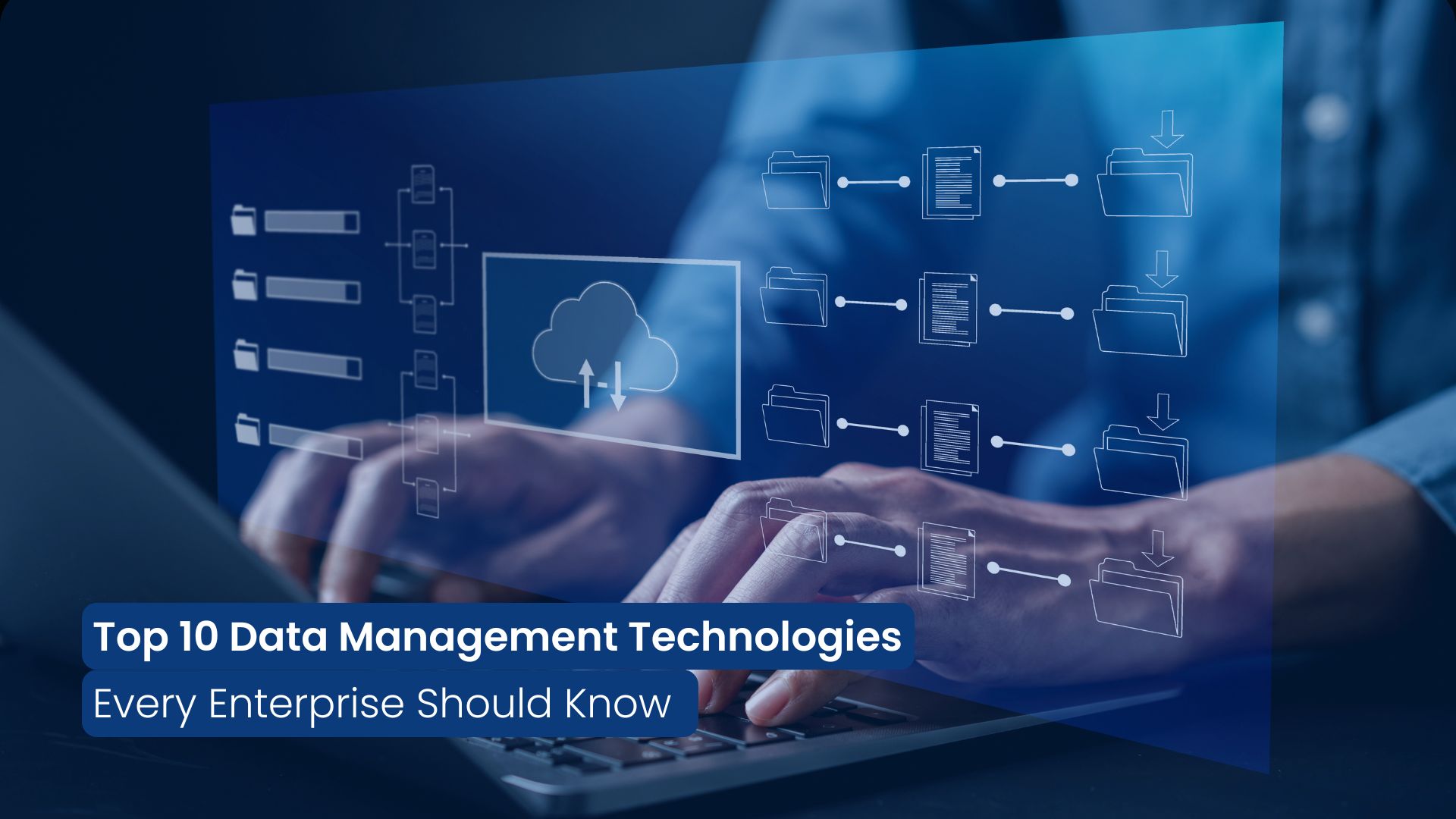Streamline Your Data Processes - Start a project!
Get customized solutions for your business - Try Our Services Today!
Streamline Your eCommerce Operations - Try Our Services Today!

Top 10 Data Management Technologies Every Enterprise Should Know
In today’s time, data happens to be one of the pillars of successful business enterprises in a highly interconnected business world. Every click, transaction, and interaction generates valuable information to provide assistance in critical strategic decisions and competitive advantages. However, as the enterprise data management market size is expected to reach 110.53 billion dollars in 2024 and grow at a CAGR of 12.4% between 2025 and 2030 where organisations face the challenging prospect of managing, organising and using data that grows exponentially across many systems and platforms.
In reality, if the company decides not to implement proper data management strategies, then there is a high risk of drowning in overloaded information, along with a lack of data insights and losing its competitive edge. On the other hand, modern organisations now generate data from innumerable sources like customer interactions, IoT devices, social media, and financial payment systems.
Without proper data management technologies, these pieces of information end up being a liability rather than an asset. Advanced data management platforms are now bringing better methodologies for powering solutions to turn scattered data into more organised, actionable intelligence systems.
Let's explore the top 10 technologies that are reshaping how enterprises handle their most valuable resource.
1. Product Information Management (PIM) Systems
PIM systems have become vital for enterprises handling complex product catalogues across multiple channels. These platforms centralise product data, thereby ensuring product data consistency and integrity across e-commerce sites, catalogues, and marketing materials while reducing time to market for new products.
The PIM solutions support digital asset management, automated data quality controls, and smooth integration with e-commerce platforms. It helps companies maintain clean, enriched, and accurate product information data, which supports omnichannel customer experience and revenue growth.
Pimcore is one of the established open-source frameworks that exist for PIM, which bridges product information management with DAM (Digital Asset Management) and e-commerce. Its flexibility and scalability make it ideal for organisations requiring complete data management software solutions.
2. Master Data Management (MDM) Platforms
An MDM solution works to create the single source of truth for all critical business data, tearing down silos & ensuring consistency across systems in the entire company. These platforms manage customer data, product information, supplier information and other master data entities that lay the foundation of business operations.
With proper MDM implementation solution, organisations can enforce data governance, thereby improving data quality for better decision-making through unified and trusted data. This technology helps regulatory compliance while cutting operational costs due to data inconsistencies.
3. Cloud-Based Data Warehousing Solutions
Modern enterprises have been preferring cloud-based data warehousing platforms such as Amazon Redshift, Google BigQuery, or Microsoft Azure Synapse Analytics. Such solutions provide scalable capacities of storage and processing without tying resources to physical infrastructure.
The cloud data warehouses can auto-scale, provide pay-as-you-use business models, and integrate with various analytic tools. These enable organisations to scale with massive datasets and query performance while supporting real-time analytics requirements.
4. Data Lake Architecture Platforms
Data lakes have transformed the ways organisations can store and process unstructured data. Through platforms like Apache Hadoop, Amazon S3, and Azure Data Lake Storage, organisations can store massive amounts of raw data in their native format until required for analysis.
This permits flexibility in choosing processing methods for the data and avoids the need for upfront data modelling. Data lakes are worthy of all forms of data like text, image, video, and IoT sensor data, making them suitable for modern analytics workloads.
5. Real-Time Data Streaming Technologies
72% of organisations believed that big data analytics was quite important for accurate business goals & real-time decision making. Upstream technologies such as Apache Kafka, Amazon Kinesis, and Apache Storm help enterprises in the process and analysis of data while it is being generated.
Streaming platforms provide support for use cases like fraud detection, recommendations personalised to a service and operational monitoring, where instant insight is critical for business success.
6. AI-Powered Data Governance Platforms
AI revolutionises data governance with automated discovery, classifications, and compliance monitoring. Tools such as Collibra, Informatica, and Alation leverage machine learning algorithms to detect sensitive data, propose data lineages, and ascertain regulatory conformance.
With AI-gov platforms being necessary for managing complex data environments in secure and compliant manners, 89% of firms have reportedly prioritised GEN AI projects, while 33% of them are already in production.
7. DataOps and Automation Platforms
DataOps platform enhances automation and establishes DevOps for the development, testing, and deployment of data pipelines. With this, tools like Databricks, Palantir, and DataKitchen accelerate the ways of producing data delivery cycles while maintaining quality & reliability.
These platforms support continuous integration and deployment for data workflows, automated testing of data pipelines, and monitoring of data quality metrics throughout the data lifecycle.
8. Multi-Cloud Data Integration Solutions
As enterprises implement multicloud strategies, data integration concerns arise between different cloud providers. Platforms like Talend, Informatica PowerCenter, and MuleSoft support unified data integration in hybrid and multi-cloud environments.
These solutions assure smooth data flow between on-premises systems and multiple cloud platforms while preserving data consistency and security standards.
9. Graph Database Technologies
Graph databases like Neo4j, Amazon Neptune, and ArangoDB are good at handling and analysing relationships between data entities. They prove to be highly useful in cases involving social networks, recommendation engines, fraud detection and knowledge graphs.
Graph databases can perform better on queries with complex relationships and offer a new form of analytical possibilities that traditional relational databases could hardly support.
10. Edge Computing Data Management
With the expansion of IoT devices, edge computing platforms enable data processing near the data sources. Solutions like AWS IoT Greengrass, Azure IoT Edge, and Google Cloud IoT Edge decrease latency and bandwidth requirements while supporting real time decision making. Edge data management is important for applications that require immediate responses, such as autonomous vehicles, industrial automation and smart city infrastructure.
The Future of Data Management
Emerging technologies like artificial intelligence, machine learning, blockchain, and data fabric are changing the face of data management. As the global enterprise data management market is on a growth trajectory, more and more strategic technology selection becomes important.
Companies that invest in all-inclusive data management platforms today will be able to use other innovations in the future, thus retaining their competitive edge. The unified platforms that converge capabilities from PIM, MDM, DAM, and analytics show the future of enterprise data management.
Custom software solutions created with client-specific needs in mind will grow in future as companies attempt to set themselves apart with superior data capabilities. Success in a data-driven economy will be marked by adaptive and evolving data management methods.
Conclusion
Data management technologies continue to evolve faster with rising data volumes, regulatory requirements, and competitive pressures. Organisations that adapt to these top 10 technologies can find success in the digital economy.
To succeed in contemporary data management, it takes more than just technology- it demands strategic thinking, right implementation, followed by continual optimisation. Irrespective of the implementation of PIM systems, MDM platforms, or complete data management software, they all align with the business objectives and growth strategies.
The investment in high-end data management platforms pays for itself in the form of better decision-making, higher operational efficiency, and a competitive advantage. As data continues to gain greater relevance, organisations that master these technologies will lead their respective industries.
Transform Your Data Management Strategy Today
As a leading custom software solution provider, Syncrasy implements proven methodologies with industry best practices to ensure measurable results. The implementation of MDM by Syncrasy for seamless integration, with a collaborative approach to address all aspects of enterprise data management.
Contact Syncrasy Technologies today and find out how our specialised data management software solutions can address your unique challenges and unlock your data's full potential. Our team of experts stands ready to assess your requirements and design a customised strategy that offers real business value.
Categories
- Digital Asset Management (DAM)
- Artificial Intelligence (AI)
- Product Information Management (PIM)
- E-commerce
- Master Data Management (MDM)
- Digital Experience Management
- Customer Data Platform
- Data Management Platform
- Recruitment
- Covid-19
- Digital Workspace
- Digital Experience Portal (DXP)
- Omnichannel Experience
- Pimcore
- Framework Comparison
- Software Development
- Learning Management Solution (LMS)
- CRM System
- Sales Portal
- Salesforce
- Blockchain Development
- App Development
- Technology
Similar Blogs

CDP Vs. DMP: Complete Overview of the Data Platforms for Your Business
Customer Satisfaction is one of the factors we need to ensure the continuity of our business. With t...
Read More
Top 10 Data Management Technologies Every Enterprise Should Know
In today’s time, data happens to be one of the pillars of successful business enterprises in a highl...
Read More

